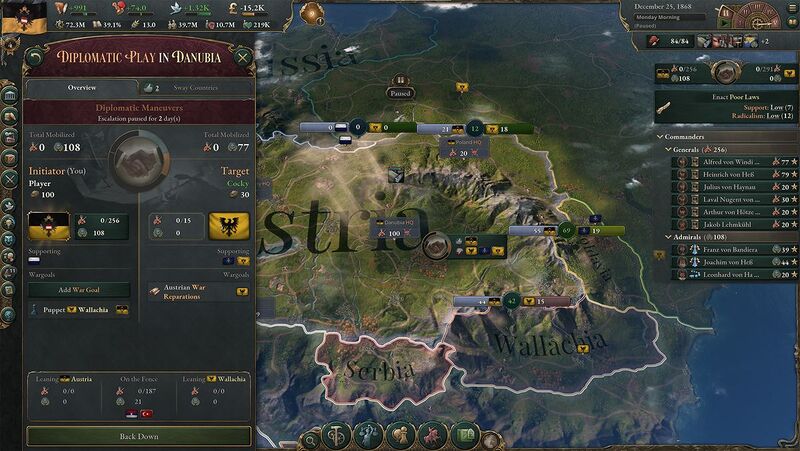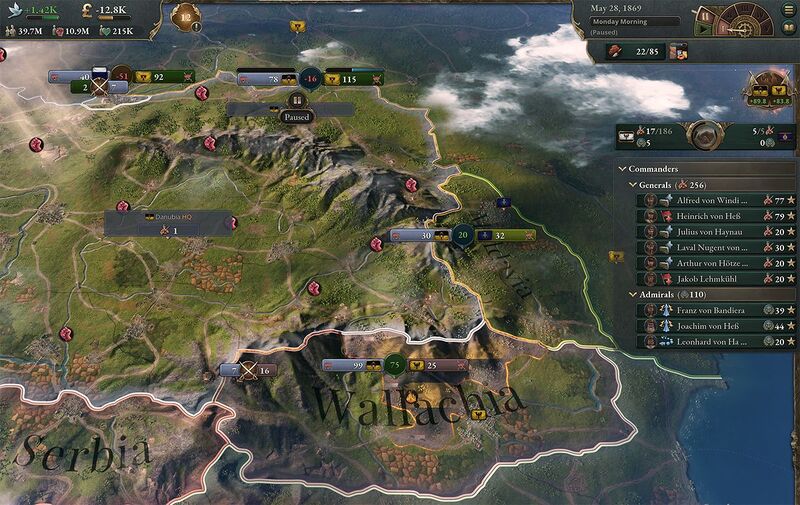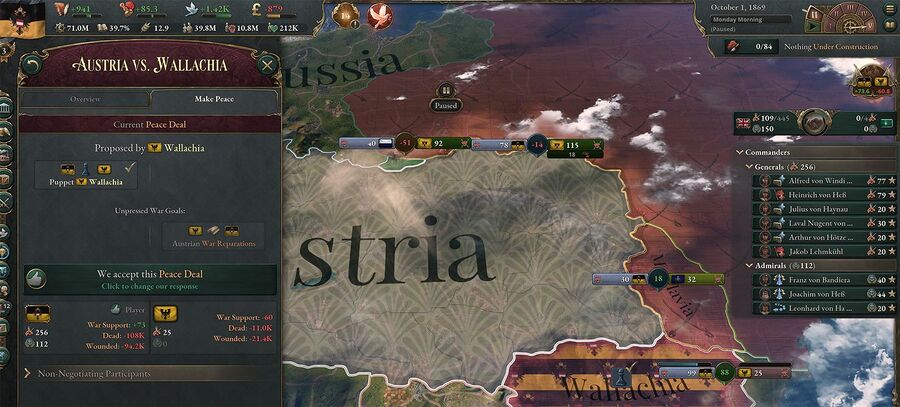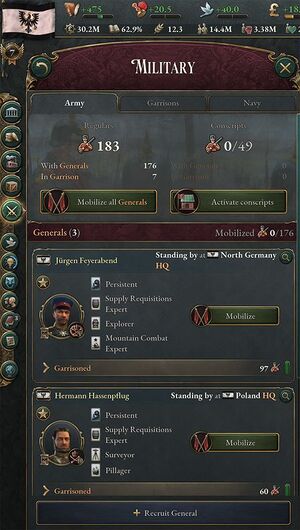When diplomacy fails in Victoria 3, it rests upon a nation's armed forces to achieve its geopolitical goals. In Victoria 3, all wars start after a diplomatic play has not been resolved peacefully and escalates to war. However, it is important to remember that mobilizing and deploying military forces during the diplomatic play is important both in projecting strength during the play (increasing the chance of the other side backing down without a war) and winning the war if it does break out.
當一切外交手段最終失敗時,國家要實現其地緣政治目標,就需要訴諸武力。在《維多利亞 3》中,所有未能和平解決的外交博弈最終都會升級為戰爭。一般來說,你應當在外交博弈過程中及時的調動和部署軍事力量,展示自身的軍事能力,從而增加對方在不發生戰爭的情況下退讓的機會,同時,一旦戰爭爆發,這些軍隊能夠及時投入戰鬥,從而獲取優勢,並最終贏得戰爭。
Military structure 軍隊組織
Armed forces in Victoria 3 are organised in four ways, and in every case it is important to be mindful of the HQ (there are separate HQs for each strategic region) they relate to:
維多利亞 3 中有四種形式的軍隊,你應當永遠注意你的軍隊所屬的總部(每個戰略區域都有單獨的總部):
- Battalions assigned to generals 從屬於陸軍將領的陸軍營
- Flotillas assigned to admirals 從屬於海軍將領的艦隊
- Unassigned Battalions 未分配的營
- Unassigned Flotillas 未分配的海軍艦隊
For battalions or flotillas to be given orders, they need to be under a general or admiral. Unassigned battalions are still useful, in that they will contribute to the defence of the strategic region in which they’re located, but unassigned flotillas will not take any part in a war. It will generally not make sense to have unassigned flotillas, as they cost upkeep but cannot be used in war. In the vast majority of cases, unassigned flotillas should be allocated to an admiral – the main exception to this are flotillas used purely for generating diplomatic interests.
要接受命令,一個營隊或一個艦隊必須從屬於一個陸軍或海軍將領。未指派的營隊仍然會參與所屬總部所屬戰略區域的防禦,但是未接受命令的海軍不會以任何方式參與戰鬥。一般來說,不應當擁有未指派的艦隊,因為這些艦隊仍然會消耗維護費用,但無法發揮軍事作用。因此,在絕大多數時候應當將你的艦隊分配給海軍上將,除非那支艦隊只是用於維持外交利益
During a diplomatic play 外交博弈中
Once a diplomatic play has started, potential fronts will appear on the map, and generals can be assigned to these fronts. While it can be the case that there are more fronts than generals, bear in mind the opposing forces will have limited numbers of generals as well, and it is not unusual for peripheral fronts to have no forces assigned on either side. It takes time to move between fronts, and it is worth considering the war goals set during the diplomatic play when assigning generals, as controlling these will become important if war does break out (controlling war goals leads to the other side's war support dropping more quickly).
外交博弈開始後,地圖上會表示出潛在的戰線,可以在這些戰線之間分配將領。雖然可能會出現戰線比將領多的情況,但請記住,對手的將領數量也是有限的,而且對於不重要的戰線來說,雙方都沒有派兵的情況也很常見。軍隊在各條戰線之間移動需要時間,在分配將領時應當考慮外交博弈中設定的戰爭目標,因為一旦戰爭爆發,軍事控制控制這些目標非常重要(控制戰爭目標會導致對方的戰爭支持度下降得更快)。

Similar to generals, once a diplomatic play has started, admirals can be assigned orders (except for naval invasion, which can’t be assigned until after war has broken out) to different sea nodes. These orders take time to prepare, so there can be value in positioning forces before war breaks out.
與陸軍將領類似,一旦外交博弈開始,就可以向不同的海上節點派遣海軍將領,並給予其命令(海軍入侵除外,其在戰爭爆發後才能分配)。由於這些命令需要時間準備,在戰爭爆發前對部隊進行預先部署是很有必要的。
Once war breaks out 戰爭爆發後
Once war breaks out, land warfare occurs along fronts, while naval warfare occurs in sea nodes. On a contested front where both sides have forces, there will be a series of battles, while naval warfare involves battles at each sea node. As would be expected, there are differences in the nature of land and naval warfare:
戰爭爆發後,前線上會爆發陸戰,而海上節點中會爆發海戰。在雙方都有軍隊的爭奪前線,會發生一系列陸地戰鬥,而海戰則會在每個海上節點爆發。以普遍理性而言,陸戰和海戰的目的顯然是不同的:
- Land warfare is about defending or capturing territory.
- 陸地作戰的目的在於防守或奪取地塊
- Naval warfare is about attacking/protecting convoys (a disrupted supply network has economic costs, and will also impact on the morale of battalions on overseas fronts), invading, and defending against invasion. Note that while the enemy supply network can be disrupted, and invading armies can be blocked, it is not possible to intercept generals and their forces in transit between fronts.
- 海戰的目的在於攻擊/護航運輸船(破壞對手的補給節點會造成經濟影響,同時會影響對手海外營隊的士氣),海上入侵和防禦海上入侵。注意:儘管你可以破壞敵方的補給節點,封鎖對方的海上入侵,但你無法阻止對手的營隊在前線之間移動。

As the war develops, both sides' war support will decline, based on a range of factors. There are some conditions that prevent war support from falling below zero, and it is worth being mindful of these, as if one side’s war support falls to -100, they will automatically capitulate and all of the war goals against them will be pressed. It is also possible to negotiate peace with some or none of the war goals pressed before this happens.
隨着戰爭進程的推進,雙方的戰爭支持度都會下降,下降速度右諸多因素影響。在幾種特定條件下,戰爭支持度可以低於0,在戰爭中應當永遠注意這點。一旦國家的戰爭支持度下降到-100,它就會自動投降,所有針對其的外交博弈將會被強制執行。不過比起自動投降,更為常見的是,在敵方支持度下降至某個閾值後,你可以試圖與之和談,他們將會同意讓出若干個外交博弈目標,以換取和平。

